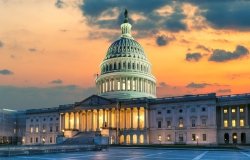Don’t Dismiss Bicameral Working Group Out of Hand
Procedural Politics
Roll Call
Oct. 9, 2013
House Rules Committee Chairman Pete Sessions, R-Texas, surprised even his own party caucus colleagues Tuesday by introducing a bill to create a Bicameral Working Group on Deficit Reduction and Economic Growth, then calling it up in his committee an hour later.
Predictably the bill was roundly denounced by Budget Committee ranking Democrat Chris Van Hollen, D-Md., and all four Rules Committee Democrats. Their main criticisms were: Supercommittees are proven failures; the bill doesn’t allow for closing corporate tax loopholes; and it replicates what the Budget committees already should be doing.
Under the terms of the bill, the working group would consist of 10 members from each chamber — six majority and four minority. It would be charged with making recommendations on the overall levels of discretionary spending, changes in the statutory limit on the public debt, and reforms in direct spending programs. The group would be appointed no later than one calendar day after enactment, would work every calendar day thereafter until it reaches an agreement (unless excused by both co-chairs) and would report its recommendations, including any legislative language, within three calendar days of adopting them. It would then go out of business.
While it is easy to dismiss the latest gambit as just another gimmick, there’s something about this effort that holds promise. First and foremost, it was introduced as a bill when a concurrent resolution, requiring adoption only by the two houses, would have sufficed.
Why a bill that necessitates a presidential signature to become operative? The most obvious reason is to assure presidential buy-in with the concept, even though he wouldn’t be a direct party to the group’s negotiations. Moreover, the special rule on the measure incorporated language from a joint resolution that immediately restores the pay of federal workers not furloughed.
But the more intriguing prospect for such a bill is that it allows the Senate to amend it with provisions that would require statutory enactment, namely a short-term continuing resolution and debt limit increase — say, to mid-November or December.
Wouldn’t such a linkage violate the president’s resistance to tying any conditions to a CR or debt bill? Not necessarily. President Barack Obama has now indicated he could support a short-term CR and debt increase to allow time for further negotiations on other matters. The key would be whether the ultimate recommendations for reducing the deficit would be directly tied to a longer-term government reopening and debt ceiling increase.
They need not be. They could be presented by the working group as separate sidecar agreements to be taken up and voted on before the CR and debt limit measures are considered.
As to the criticism that the bill wouldn’t authorize tackling tax reform, the fact is that it doesn’t prohibit it. And that’s certainly something else the Senate could also add in the form of a timetable for reporting tax reform measures in both chambers. One could even interpret the bill’s term “direct spending programs” to include tax loophole plugging, since such provisions are referred to in the Budget Act as “tax expenditures,” while the act’s term for mandatory spending programs like Social Security and Medicare is “entitlement authority.”
As to the criticism that the working group would usurp the Budget Committees’ responsibilities: yes and no. Budget Committees do recommend overall discretionary spending limits and changes in entitlement, revenue and debt levels. But they can’t directly report bills implementing those recommendations. The working group is authorized to do so.
Sessions may actually have come up with a plausible first step in an expedited exit strategy from the mess his party has wrought. Let’s see if the Senate has the good sense to build on it.
About the Author

Donald Wolfensberger
Former Director, the Congress Project, Wilson Center; Former Staff Director, House Rules Committee











